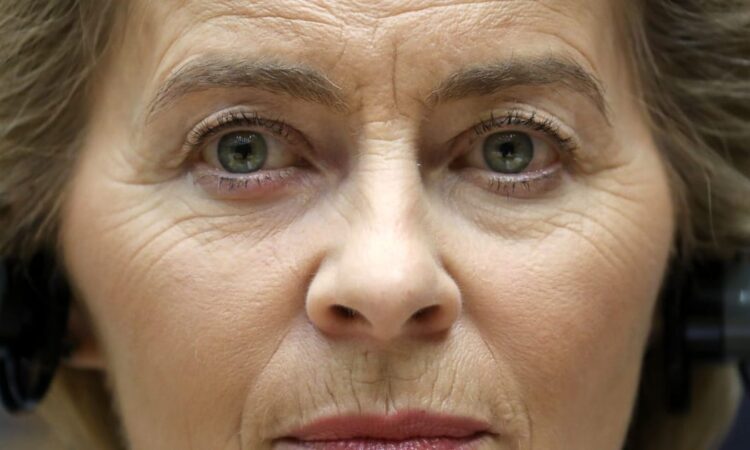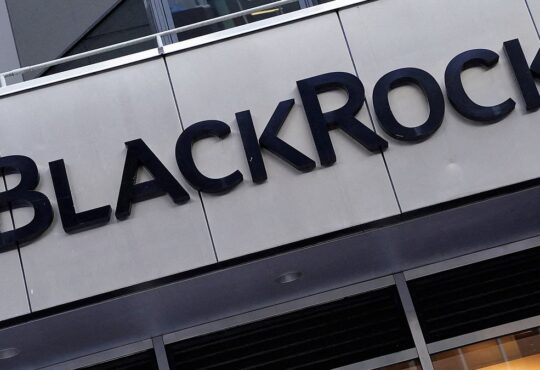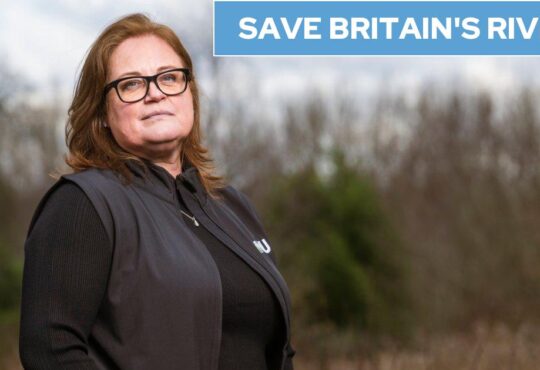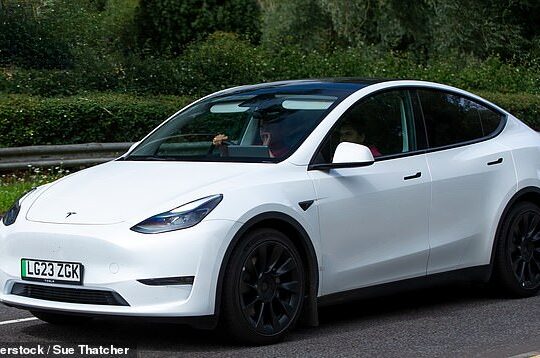
Ursula von der Leyen wants to sell you on Europe — via Germany.
Starting in 2024, the EU’s top executive is planning to double the European Commission’s annual communications budget from €30 million to €60 million. There’s a war on, the rationale goes, and Europe can’t afford to lose out in the battle to capture the narrative. Disinformation is rampant. Disillusionment is creeping in.
“Particularly, in times of crisis, it is more important than ever that democratic institutions communicate clearly to all citizens about their actions to solve our most pressing challenges,” a Commission spokesperson said.
But the Commission’s plan to operate and fund the endeavor already has people bristling.
On the operation side, von der Leyen has brought in another aide from Berlin to steer the project, adding to a pile of criticism that she is too reliant on German confidants. And a big, €5 million PR contract was also recently awarded to two German sister companies under an accelerated procedure, fueling suspicion the EU’s comms may become a “made-in-Germany” affair.
On the funding side, the Commission is proposing to siphon off money from existing EU funds such as for agriculture, research, migration or the Erasmus student exchange program. That has both the right and the left raising eyebrows in the European Parliament.
The whole thing is a touchy issue for von der Leyen. Contracting controversy has trailed her for years, resulting in several inquiries, and she rarely gives interviews.
“Bloodless information campaigns can also be developed with fewer resources,” said German MEP Rasmus Andresen, the Greens’ budgetary spokesperson.
“I would like to hear from her what she plans precisely to do with that money, and why the current budget is not enough to fulfill the Commission’s communication tasks,” said Johan van Overtveldt, a right-wing Belgian MEP who chairs the Parliament’s budget committee.
He added that the plan to take away money from funds like research or Erasmus was “irresponsible” and “not acceptable.”
I’ve got a pitch for you
The spending spike would only kick in after next year’s EU elections, the Commission said — an attempt to ensure the money isn’t being used to burnish von der Leyen’s reputation during election season. Von der Leyen has strong support for a second term but hasn’t yet declared whether she will seek one.
But after that, the plan would earmark €60 million a year for four years, meaning that whoever becomes the EU’s top executive after the 2024 elections — von der Leyen or a successor — would enjoy a more muscular PR budget.
Already, von der Leyen rarely gives interviews without restrictive ground rules, preferring more scripted situations. But the Commission argued it had a “duty to provide information to the general public” beyond communicating with the press.
“While the press covers the EU’s work well and extensively, it is important that we also speak to citizens directly,” the spokesperson said.
And the plan, which doesn’t raise overall spending, is “in line with the EU’s principles of good financial management,” the spokesperson added. EU institutions have been facing pressure to reduce expenses as war-time costs mount and high inflation lingers.
The proposal would be adopted “soon,” the spokesperson noted.
The money, which the Commission calls its “corporate communication” budget, would come on top of a separate €200 million comms budget the EU executive shares with several other EU institutions, including the European Parliament, the European Investment Bank and the EU’s diplomatic branch. That money is scheduled to run through 2025.
A German production?
Yet while the money management decisions may spark institutional fights with Parliament, it’s the plan’s German connections that may raise eyebrows more broadly.
Dirk von Holleben, a longtime von der Leyen aide from her days as Germany’s defense minister, is overseeing the bolstered PR push. He originally moved to the Commission about one year after von der Leyen’s appointment as Commission chief in 2019, following his work with the German armed forces to promote its jobs through videos and social media campaigns.
His first role at the Commission was as an “information and communication officer” within the Commission’s press service. There, he began coordinating a large part of PR efforts for von der Leyen, causing friction with another office that had traditionally handled such duties, according to two Commission officials who spoke on the condition of anonymity due to the sensitivity of the matter.
In May, he was promoted to the role of “adviser for corporate communication campaigns,” which comes with a high-level Commission salary grade between €14,000 and €16,000 per month. The role gives him direct input on the Commission’s comms strategy, the institution’s spokesperson said.
Von Holleben joins the already German-heavy cast that surrounds von der Leyen. There’s Björn Seibert, her head of cabinet, and Jens Flossdorf, her communication adviser, who both also previously worked with her in the defense ministry in Berlin.
The Commission president also hired Peter Müller, a former German journalist, as communication adviser and speechwriter.
Von Holleben’s work arrangement may also irk some within the Commission. He currently lives with his family in Paris, only commuting to Brussels for two days each week. That’s highly unusual for Commission staffers, who are normally only allowed to work from remotely abroad for 10 days each year. The Commission is allowed to create exemptions for “imperative family reasons,” but those must be renewed every month.
The Commission declined to comment on the specifics, but said: “All arrangements are in full compliance with the staff regulations.”
You are EU … and Germany
The Commission’s comms team has also been establishing German links as it hands out contracts to promote its work.
Just last year, the Commission awarded the German firm 365 Sherpas and its sister company Zum Goldenen Hirschen a contract worth up to €5 million to craft its “You are EU” campaign, which seeks to raise citizen’s awareness of the need to shift to renewable energies.
Controversially, the Commission skipped the usual bidding process to accelerate the contract. Instead, the Commission said it conducted “market research and interviews” with four companies in different EU countries before awarding the work to the German companies, which are both located in the same building in Berlin-Kreuzberg, near the Spree River.
Von der Leyen’s spokespeople defended the move, citing the need to move swiftly as war raged, Russian oil dried up and the EU raced to get people to shift their energy habits. “In exceptional circumstances, the Commission can proceed to a negotiated procedure without prior publication of a contract notice,” the spokesperson said. And in this case, the spokesperson added, there was an “urgent need to communicate to Europeans about the effects of the war in Ukraine and the EU response to these effects.”
Yet the decision also meant other (and potentially non-German) firms may have lost a shot at bidding for the lucrative offer. Ultimately, the Commission said it paid out €1.8 million to the companies, instead of using up the whole contract.
Cornelius Winter, the founder of 365 Sherpas, said the Commission directly reached out to his firm and suggested it apply for the contract.
“We were contacted as part of a screening by the European Commission and asked to present our competencies in the areas of energy … and communication in crises/special situations,” Winter told POLITICO. “We presented these in an interview together with initial approaches for the campaign communication … and were then asked to submit a bid.”
The Commission spokesperson called the “You are EU” campaign “the biggest and the most successful campaign the European Commission has done so far.”
Von der Leyen has previously found herself embroiled in questions over her contracting decisions.
As German defense minister, she was swept up in a scandal involving allegations that large contracts were being handed out without proper oversight. A parliamentary investigation later found no clear evidence that von der Leyen was responsible, but the incident has nonetheless become part of her narrative.
Another part of that narrative: von der Leyen’s decision in 2020 to hire Storymachine, a PR firm founded by an-ex editor of Germany’s Bild tabloid, to advise on her personal social media presence. And more recently, a criminal complaint was launched against von der Leyen in Belgium over her refusal to release text messages that may have played a crucial role in negotiating coronavirus vaccine contracts.
So while the Commission’s boosted PR budget won’t be used to airbrush von der Leyen’s image in an election year, if she does stick around, it may help for years to come.
Van Overtveldt, the budget committee chief, said that the plan would be challenged in Parliament: “It’s not a done deal.”





